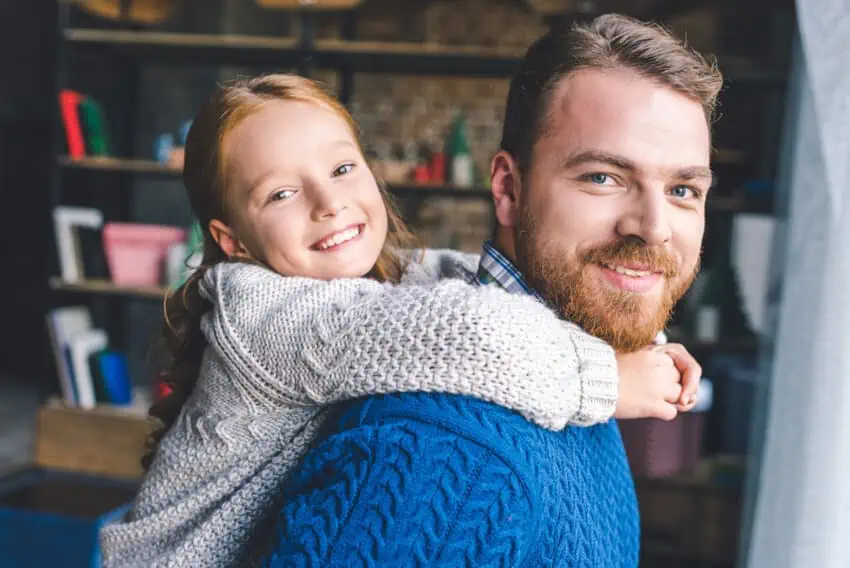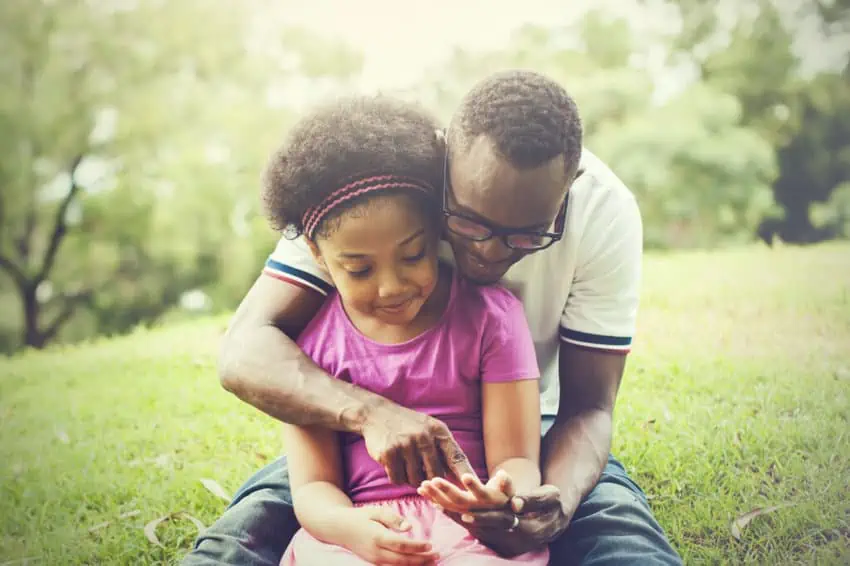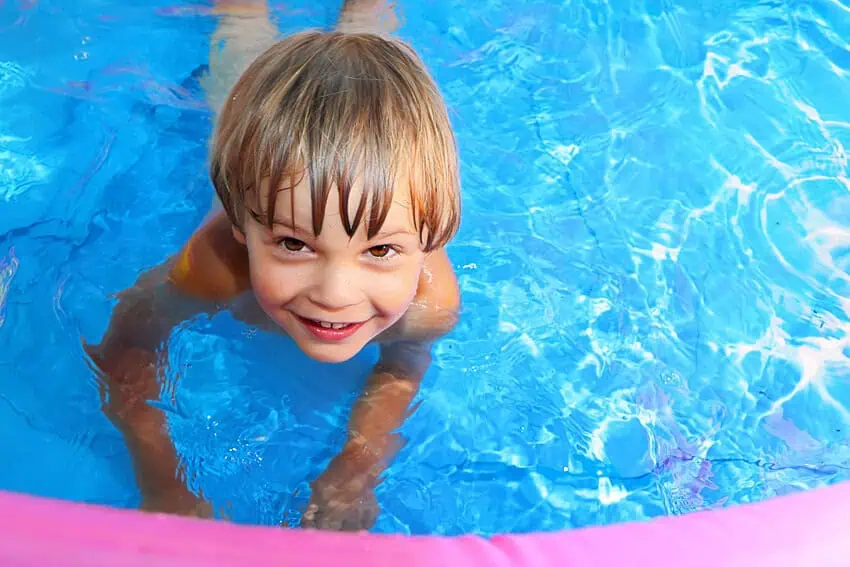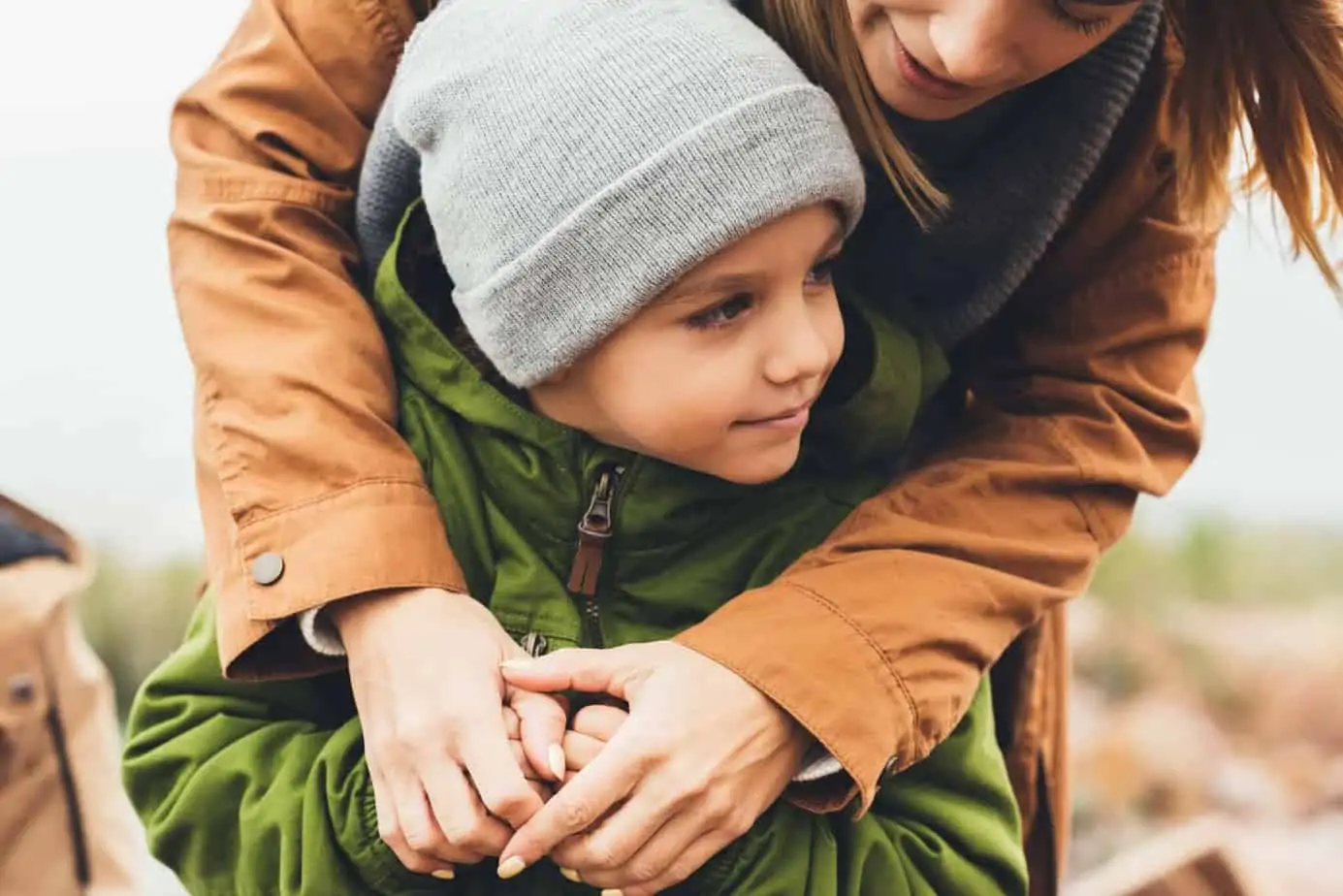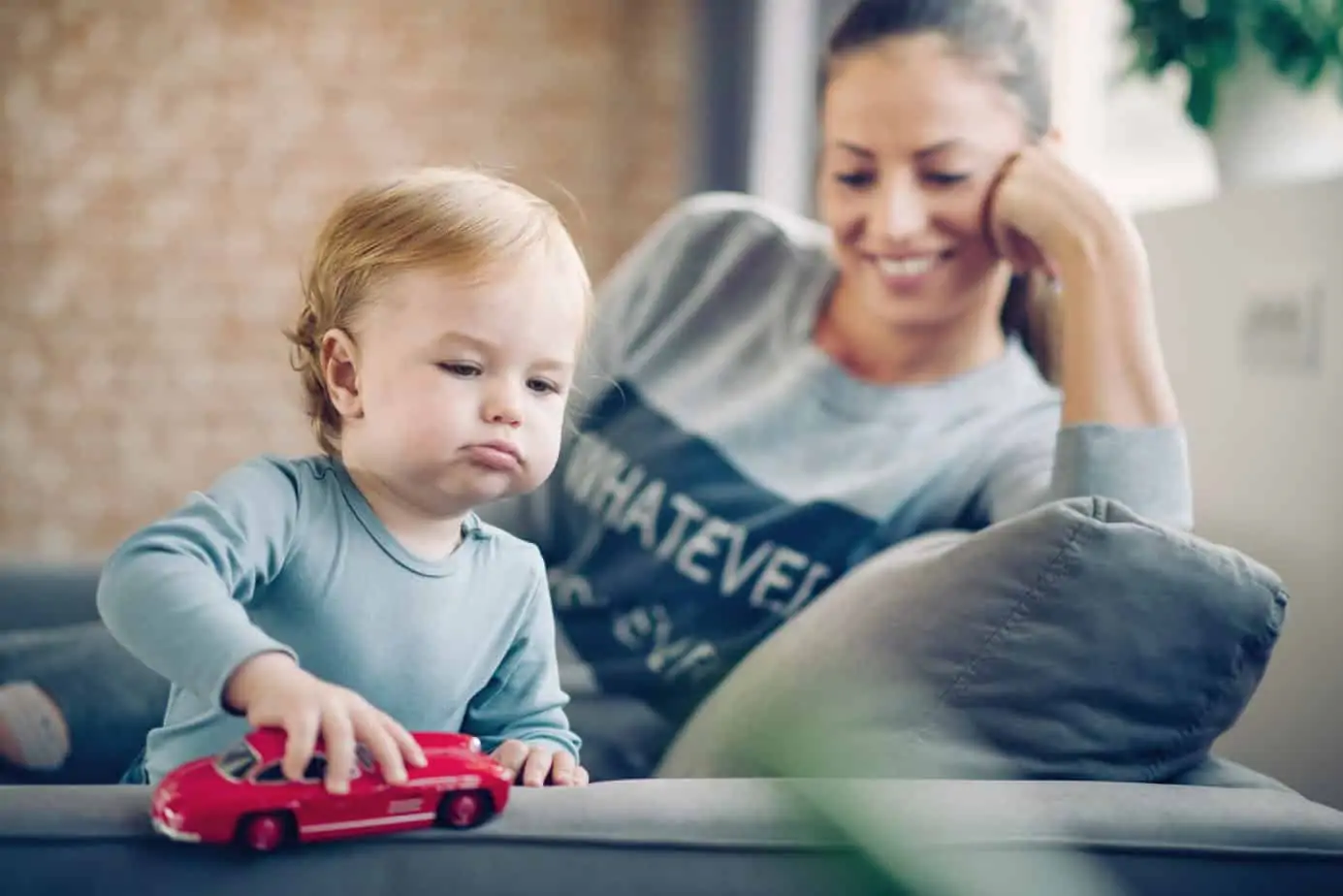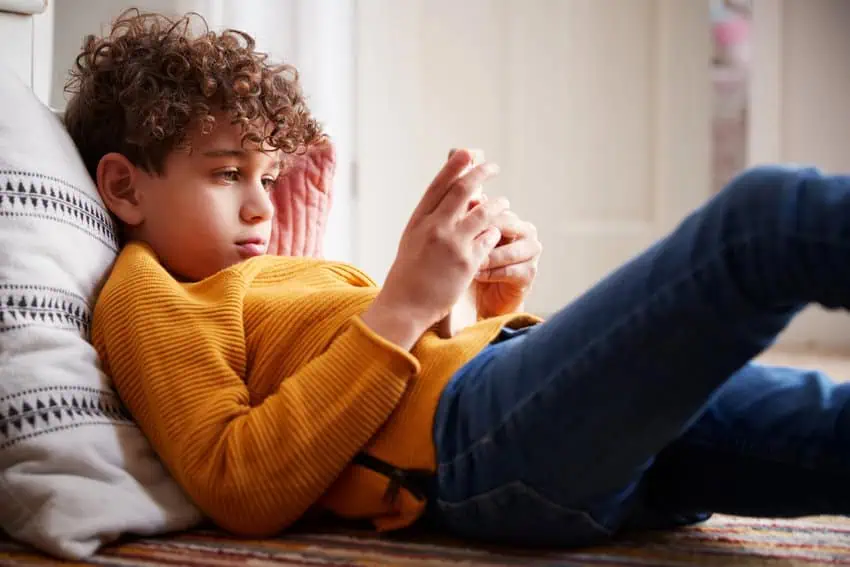Discover the power of being present, and Being Present: A Guide to Creating Mindful Habits for Parentsto benefit your relationships and your child’s development.

Being Present: A Guide to Creating Mindful Habits for Parents
You can’t underestimate the value of being there for your family. Find out how to be more present in your everyday life to strengthen your family ties and create more mindful habits for yourself.
(IMAGE)
Lately, it seems like we’re all working towards being present. Whether that means less screen time or better active listening, being present in the moment is something many of us are striving for.
And it’s no wonder – there are so many distractions taking our focus!
But learning how to be more present is a worthwhile pursuit, bringing us peace and stronger relationships while modeling the same behaviors for our children.
In this post, I’m covering several tactics for being present, with mindful parenting techniques, strategies for being attentive, and concrete ways to practice mindfulness in your everyday life.
I’m also including the benefits of mindfulness and being present for both parents and children – I promise it’s worth the hype!
Understanding What Mindfulness Means
The practice of mindfulness is all about being present; it’s being focused and aware of current experiences. The practice is calming, neutral, and intentional.
Many use mindfulness to reduce stress, be more present in their day-to-day, and approach conflicts with a grounded spirit.
It makes sense, then, that mindfulness is extremely beneficial to parents.
Promoting mindfulness can change the atmosphere of a home, making it a more relaxed, positive place to be.
It can also cultivate more self-gratitude, appreciating your abilities and strides as a parent and remaining thankful for the good through difficult times.
The practice:
- reduces stress levels
- improves emotional regulation
- increases patience
All qualities that are incredibly important when positive parenting!
You may also notice an improvement in decision-making, becoming less reactive in challenging situations.
Parents who focus on being present with their children experience a stronger connection to their family, appreciating every moment spent together.
Finally, one of the biggest impacts of mindful parenting is how these behaviors are picked up by children.
Your children will model all of these healthy habits, teaching them the power of being present from an early age.
Practical Ways to Be More Mindful
Being present in the moment can feel a bit abstract without concrete examples.
Here are a few practical ways to be more mindful in your everyday parenting:
1) Practice Gratitude
Take a moment to think about what you’re grateful for, then share. You can practice this at dinner with your family, before bedtime, or whenever fits your schedule.
Grab a notebook or gratitude journal such as the five-minute daily journal or this daily gratitude journal with daily prompts to help you start and stick with a gratitude practice.
2) Mindful Listening and Response
Promote active listening through modeling, giving your child your full attention, and validating their experiences.
You can also promote mindful responses, particularly in moments of conflict. Practice taking a breath before responding impulsively.
3) Practice Present Moment Parenting
Present Moment Parenting is exactly what it sounds like – being present in the moment and fully enjoying your time spent together without distractions like work, technology, or anxieties.
Mindful playtime is a good example, where both child and parent immerse themselves in the joy of play!
4) Watch Transitions
Transitions like getting ready for school or going to bed can be surprisingly stressful activities. And because they’re also daily, these small stresses tend to add up over time.
Approach these moments with a sense of calm, promoting routine without negativity. For a peaceful bedtime routine, this might include a snuggle or bedtime story.
5) Model Self-Understanding
No one ever said that parenting is easy.
Practice a bit of self-understanding, acknowledging your triumphs, and treating yourself with kindness in times of conflict.
If you take the time to show yourself compassion, your kids will learn to do the same.
How to Be Present with Your Kids
We all know the importance of quality time with our kids. But being present during this time is necessary for real growth.
Benefits of present quality time include:
- Stronger relationships
- Higher levels of security and trust
- Better communication and understanding
- Continual emotional support
- The creation of lasting memories
When you set aside quality time for you and your children, use these easy strategies to be more present in the moment:
* Be an Active Listener
Practice active listening, giving your full attention, using body language to show understanding, and making eye contact.
* Practice Breath
If you feel yourself being distracted by stressors, take two mindful breaths and refocus.
* Ditch the Devices
Put devices away to limit distractions. I also recommended putting your phone on silent, reducing temptations to peek at your screen.
* Set Boundaries
Set clear boundaries about this quality time, not allowing other tasks like work to take precedence.
* Create Rituals
Make quality time into regular rituals, like a family movie night or a Sunday pancake breakfast.
Repeated activities are easier to follow; plus, family members can get excited for these special moments.
* Make it Count
Prioritize quality over quantity, making each moment count!
Even if you don’t have hours to spare, a few meaningful minutes can make a big difference in showing up for your kids.
* Share Gratitude
Show gratitude for the time you spend with your family; modeling the value of quality time is a great way to instill these values in your children.
* Make it a Family Affair
Make mindfulness a family affair by practicing simple breathing techniques, meditation, active listening, and more.
Creating Mindful Habits
Creating any new habits with our ever-busy schedules is always a struggle, especially with something as conceptual as “being present.”
Here are a few ways you can create lasting mindful habits and easily implement them into your life:
Set Your Goals
Set clear, measurable goals. “Being present” is much too broad. Instead, opt for concrete examples like being an active listener during conversations or expressing verbal gratitude every day.
Start Small, Aim Big!
Begin with manageable changes, granting you small successes that can transform into big wins!
Be consistent when making these mindful habits, aiming to tackle your goals on a daily basis.
Use Routine
Build these habits into your established routine, making them easy to practice without making big changes to your schedule.
Practice Patience
Be patient in your efforts. Creating new habits takes time, and that’s ok!
In order for something to become a habit, you’ll need to practice it again and again. Over time, it’ll become instinct.
Track Your Progress
Keep yourself accountable by tracking your progress with a friend or family member. Acknowledge wins and setbacks – both are great learning tools.
The Impact of Mindful Parenting
Mindful parenting benefits more than just the parents. Children show a huge benefit from your efforts in being more present in the moment.
Behavioral Benefits
As children observe their parents regulate their emotions, they learn to model healthy examples of expressing emotion. Children show a deeper understanding of their feelings and how to express them appropriately.
In turn, this mindful parenting style can also result in lower levels of aggression, less need for discipline, and fewer power struggles.
Children also learn the integral skill of empathy through mindfulness, showing more understanding and compassion for those around them. They can also develop higher self-esteem, translating this non-judgemental compassion to themselves.
Children who engage in mindfulness with their parents are shown to have enhanced cognitive abilities like concentration and problem-solving. These mindful techniques also translate to more resilience in stressful situations and even healthier sleep patterns!
Finally, children who grow up in a household that champions mindfulness and being present can enhance their social skills, teaching them how to better navigate intrapersonal relationships and communicate with their friends.
Relationship Benefits
Before you notice all of the developmental benefits that mindfulness can provide your children, you’ll likely first encounter the ways it benefits your familial relationships.
First, you’ll experience better communication as family members listen intently to each other and respond in calm, non-reactive ways.
Next, you’ll benefit from deeper emotional connections, feeling attuned to your children’s emotional needs. This helps everyone feel more safe, secure, and trusting in their relationships.
Other relationship benefits also include increased independence, better conflict resolution, and mutual respect between children and parents.
Overall, a mindful parenting style promotes secure attachment in children, allowing them to experience the world while feeling safe and supported in their home base.
If you want to maximize these benefits, consider the concept of mindfulness with your children!
Practice short bits of meditation, mindful breathing, expressions of gratitude, and other strategies to bond over the experience while also developing new skills.
The Takeaway
Being present with your children isn’t just beneficial; it’s a necessity – one that is easy to forget with the constant distractions and stressors that plague our lives.
But by practicing mindful habits in our parenting and day-to-day activities, we can be more present, increasing the quality of time we spend together and the peace we feel within ourselves.
I hope you’ve found this post useful in guiding you to a more grounded, present parenting style.
In truth, practicing mindfulness is easier said than done. The effort, however, is well worth the benefits!
More on Stress Relief and Emotional Regulation:
- Parents: Get Immediate Relief from Anxiety & Stress
- Navigating Puberty: Tween/Teen Hormonal, Physical, Emotional Changes
- Parenting Stress: 8 Tips for Making Life Better & Eliminating Stress
- Stop Being a Stressed Mom: Surefire Strategies for More Happiness
- A Guide for Kids on How to Overcome Test Anxiety
Want even more?
Shop All Parenting Resources
Shop all of our parenting resources from self-regulation tools and managing big emotions to building self esteem and confidence. There are resources for all seasons of life!

